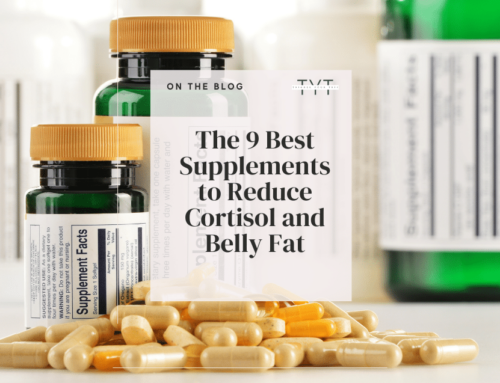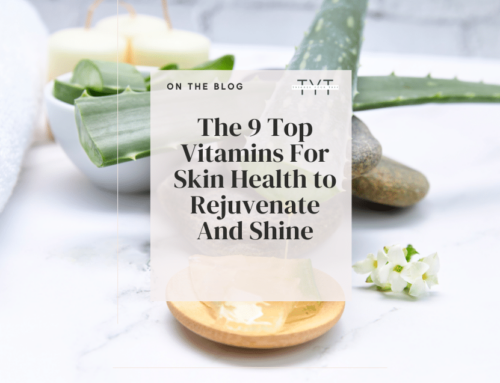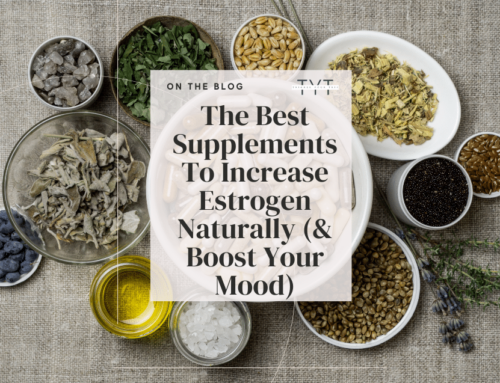Dreaming of tiny toes and sweet baby giggles? I feel you! Before I became pregnant with my son, I looked all over the internet for ways to boost my chances. You’ve just found the perfect guide to give your baby-making journey a little nudge. This article is about top fertility supplements that could help you get pregnant faster. So, let’s settle in and look at the vitamins and nutrients that might become your trusty sidekicks on this exciting path to parenthood.
How Does Nutrition Impact Female Fertility?
Did you know that what you eat can be a huge part of your journey towards motherhood? Yep, nutrition is like a backstage crew for fertility treatments and pregnancy outcomes, working hard to keep your hormones dancing to the right tune and your reproductive health in tip-top shape.
A well-chosen menu can be a game-changer for ovulation and egg quality, those VIPs in the baby-making process. So, let’s dive into how you can tweak your diet to increase your chances of hearing the pitter-patter of tiny feet sooner! There is so much evidence supporting the importance of nutrition with regard to fertility, and it’s very important to follow it and research it as well.
Read More: The 9 Top Vitamins For Skin Health to Rejuvenate And Shine
Why Do I Need to Take Vitamins or Fertility Supplements?
You might wonder, “Why should I consider popping some prenatal vitamins or fertility supplements since I eat well?” Well, imagine your body is like a garden where you want the most beautiful flowers to bloom—that’s your future baby. Now, to get that garden ready, you need the best nutrients in the soil, right? That’s exactly what these supplements do for you.
They fill in nutritional gaps in your diet, ensuring your reproductive system has all the good stuff to work magic. They’re like your personal fertility squad, cheering on your body’s ability to create a cozy nest for conception.
So, if you’re on the baby-making path, consider adding these supplements to your wellness team to boost your fertility and get your body baby-ready! Below, I’ll provide a solid understanding of the need for Vitamins and their importance as fertility supplements.
Read More: The 9 Best Supplements to Reduce Cortisol and Belly Fat
The Best Tips for Female Fertility When Trying to Conceive
Embarking on the journey to motherhood can be exhilarating and, at times, challenging. Knowing the best practices for boosting fertility is crucial as you step into this new chapter.
Here, you’ll find valuable insights and actionable tips to optimize fertility health. Understanding your menstrual cycle and adopting lifestyle changes that nurture your reproductive system are key strategies to enhance your chances of conception.
This guide walks you through these tried-and-true tips to support your quest to become pregnant, ensuring you’re well-equipped with knowledge and confidence during this beautiful pursuit.
Double Check Your Cycle Is Between 21 and 35 Days
Observing the length of your menstrual cycle can be a revealing first step in assessing your fertility health. A cycle between 21 and 35 days is generally considered within the normal range, indicating that your body follows a predictable ovulation pattern.
Tracking your cycle not only helps you pinpoint the optimal window for conception but also allows you to detect any irregularities early on. If you notice that your cycles are shorter or longer, it might be a cue to consult a healthcare provider to ensure everything functions as it should on your journey to conception.
Try Out an Ovulation Test
Thinking about ovulation tests? They’re like your personal fertility detectives. These handy kits are about detecting that tell-tale surge in Luteinizing Hormone (LH) just before ovulation.
It’s like getting a secret nudge saying, “Hey, now’s a great time to try for a baby!” By zeroing in on these super fertile days, you could significantly increase your chances of seeing those coveted two pink lines on a pregnancy test.
So, if you’re ready to fast-track your journey to positive vibes and pregnancy, ovulation tests might be your go-to strategy in the baby-making toolkit.
Reduce Stress
Stress? Yeah, it’s the party crasher in your fertility journey, throwing hormones and ovulation into a frenzy. But guess what? You’ve got the power to show stress the door.
Picture stress-busting moves like yoga, meditation, or a blissful bubble bath as your personal chill-out playlist. They set the stage for your body to become a welcoming haven for new life. Furthermore, research also suggests the impact stress can have on your pregnancy, so keep that negative energy as far away as possible.
Quit Smoking And Reduce Alcohol
Smoking and excessive alcohol consumption are primary fertility foes. Smoking can affect the quality of your eggs, and if continued during pregnancy, it harms the developing fetus. Alcohol, while it might seem harmless, can disrupt your menstrual cycle and ovulation.
For the health of your future baby and your own fertility, it’s best to quit smoking and limit alcohol intake. NHS guidelines also recommend quitting smoking, alcohol, or drugs while pregnant.
Consult a Doctor For Prenatal Exams
A prenatal check-up is key before starting your family. Your doctor will assess your health, uncover any issues affecting fertility, and guide you on necessary lifestyle adjustments. This step ensures you’re prepared for pregnancy, enhancing your chances of a smooth journey to parenthood.
Have Faith
Holding onto hope is essential in the fertility journey. It means maintaining a positive outlook and having confidence in your body’s ability to conceive. Faith isn’t about ignoring facts but instead adding a dash of optimism. Every step forward brings you closer to the joy of parenthood.
Create a Balanced Diet
A balanced diet is crucial for overall health and particularly fertility. Envision your meals as a palette of nutrients—fruits, vegetables, whole grains, proteins, and fats—that prime your reproductive system for peak performance.
Your diet is a pivotal factor in supporting fertility in your quest for parenthood, and you can craft a delicious and nutritionally rich menu. The NHS also suggests that a healthy diet during pregnancy is critical to ensuring success.
Read More: The 12 Best Supplements To Increase Estrogen Naturally
What Foods Should I Eat to Increase Fertility?
Your diet’s got your back, acting as your trusty first mate on the high seas of conception. The right foods are like secret agents for fertility, ready to boost your chances and set the stage for a healthy pregnancy. Let’s peek at the nutritional heroes you’ll want to enlist.
Think protein-rich lentils and eggs or the omega-packed goodness of salmon and walnuts. These aren’t just tasty treats; they’re your fertility allies, each bite bringing you closer to that heartwarming positive on a pregnancy test!
Lentils
Lentils, a powerhouse of folic acid, are a fantastic fertility booster with high protein and fiber content. They’re a culinary chameleon, easily spicing up soups, salads, and stews while fortifying your fertility and reproductive health with every delightful bite.
Berries
Berries, nature’s candy, are brimming with antioxidants that support reproductive health by providing vitamins like C and folate. These juicy gems help shield cells from damage, potentially enhancing fertility and paving the way for a healthy pregnancy.
Eggs
Eggs are a nutritional powerhouse, offering a bundle of vitamin D, B12, protein, and choline, all crucial for reproductive health and pivotal for brain development in embryos. They’re a versatile breakfast option that can also be enjoyed in quiches and salads.
Walnuts
Walnuts are a tasty snack that provides a wealth of omega-3 fatty acids, antioxidants, selenium, and magnesium. These nutrients support reproductive health and improve sperm quality, making walnuts an intelligent addition to any fertility-focused diet.
Salmon
Salmon is a fertility superfood, rich in omega-3 fatty acids, vitamin D, and selenium. Its consumption is linked to promoting hormonal balance and reproductive health, making it an excellent choice for those aiming for nutritional support in their conception journey.
Leafy Greens
Leafy greens such as spinach, kale, and Swiss chard are nutrient-dense and packed with folic acid, iron, calcium, and antioxidants. They’re essential for a robust reproductive system and must be included in any diet aimed at optimizing fertility.
Citrus Fruits
Citrus fruits, like oranges and grapefruits, are high in vitamin C and folate. These nutrients aid in hormone balance and protect reproductive cells from oxidative stress. They’re a refreshing snack that can brighten any meal while supporting fertility goals.
Asparagus
Asparagus, a springtime favorite, is a bounty of folate, vitamins K, C, E, B, zinc, selenium, and antioxidants. Its role in supporting DNA synthesis and reproductive health makes it a valuable veggie for conceiving couples.
Sunflower Seeds
Sunflower seeds are tiny but mighty, packed with vitamin E, selenium, and folate. They can improve sperm quality and overall fertility, making them a crunchy and convenient snack for anyone looking to boost their reproductive health.
The 10 Best Fertility Supplements, According to a Dietitian
Let’s take a moment to chat about the fertility-boosting buddies that might make a difference in your journey to parenthood. Below is a list, carefully curated by a dietitian, of the top dietary supplements known for their potential to spruce up reproductive health.
Think of each one as a personal cheerleader for your body’s baby-making team. From giving your eggs and sperm a quality boost to getting those hormones in harmony, these supplements are the behind-the-scenes heroes. Are you curious about what they can do for you? Keep reading to uncover each nutrient’s secrets for your path to conception.
Folic Acid
Folic acid is a form of Vitamin B9 that’s crucial for DNA synthesis and repair. It’s an essential nutrient for both men and women when it comes to fertility. Folic acid is known for helping prevent neural tube defects in the early stages of pregnancy, which is why this vitamin is often recommended for women who are trying to conceive.
Folate
Folate is the natural form of prenatal Vitamin and B9 found in food sources like leafy greens, beans, and citrus fruits. Like folic acid, folate plays a significant role in DNA production and repair, and adequate levels are essential for optimal fertility and the development of a healthy baby.
Omega 3 fatty acids
Omega-3 fatty acids, found in fish like salmon and in flaxseeds, are vital for regulating hormones, improving egg and embryo quality, and supporting overall reproductive health. They also play a role in sperm health, making them essential for couples looking to conceive.
Acetyl L-Carnitine
Acetyl L-carnitine is an amino acid that is associated with improved sperm quality and sperm motility. It acts as an antioxidant in the body, protecting cells from damage, including those involved in reproduction.
Zinc
Zinc is a trace mineral essential for both male and female fertility. For men, it’s crucial for sperm production and testosterone synthesis, and for women, it contributes to ovulation and fertility.
B12
Vitamin B12 works closely with folate to help create DNA. It is particularly important for the health of red blood cells and the nervous system. A B12 deficiency can lead to anemia, which can negatively affect fertility.
Vitamin C
Vitamin C is an antioxidant that can improve hormone levels and increase fertility in women. For men, it can protect sperm from oxidative damage and improve its quality and motility.
Selenium
Selenium is a powerful antioxidant that helps protect the body from oxidative stress, which can damage cells and tissues, including reproductive organs. It’s important for sperm formation and may help prevent miscarriages.
Vitamin E
Vitamin E is another antioxidant that’s important for fertility. It helps protect cells from oxidative stress and can improve the health of the reproductive system.
CoQ10
Coenzyme Q10 (CoQ10) is an antioxidant that improves energy production in cells and has been shown to improve sperm and egg quality, potentially increasing the chances of conception and a healthy pregnancy.
Read More: The 9 Best Anti-Inflammatory Supplements You Need To Be Taking
Micronutrients and Female Fertility
Think of micronutrients as the backstage crew in the female fertility show. They’re like the unsung heroes, quietly working behind the curtains to ensure every part of the reproductive system gets a chance to shine.
These tiny but mighty nutrients significantly affect hormone production, egg quality, and reproductive health. Imagine if one of them missed a cue—suddenly, the delicate process of conception could snag. So, let’s spotlight these essential players and discuss how they contribute to the intricate dance of fertility.
Best Supplements to Balance Hormones and Micronutrient Levels for Fertility
Finding that sweet spot where hormones and micronutrients are in sync on this fertility journey is a big deal. The right supplements can be like your personal health conductors, ensuring everything’s playing together nicely for conception to take center stage.
Here, you’ll get the scoop on the top supplements that tune up your body’s hormonal harmony and boost those all-important micronutrients. Imagine a mix of age-old herbal wisdom and the latest nutritional know-how, all aimed at giving your fertility a standing ovation.
Vitex
Vitex, or as some like to call it, chasteberry, is a natural herb that’s been around the block for centuries. It’s got this knack for balancing hormones, especially progesterone. Think of it as a gentle nudge to your endocrine system, saying, “Hey, let’s get those cycles regular,” which is super important when you’re on a mission, trying to get pregnant or conceive.
Fish Oil
Fish oil is rich in omega-3 fatty acids, the building blocks for hormone production. It’s also good for your heart and brain and crucial to creating a healthy pregnancy environment. So, fish oil is your fertility ally, supporting everything from egg quality to embryo development.
Magnesium
Magnesium is like the chill pill of the mineral world. It’s known for kicking stress to the curb and helping you catch some Zs, which are key when baby-making is on the agenda. Plus, it’s a part of over 300 biochemical reactions in your body, including those that regulate reproductive hormones. Getting enough magnesium might be just the ticket to setting the stage for conception.
Probiotics
Probiotics are the good guys hanging out in your gut, keeping your digestive system in check and your immune system on its toes. But here’s a fun fact: they also have a role in reproductive health. By promoting a balanced microbiome, probiotics might help create a cozy environment for pregnancy to take hold.
Vitamin D
Vitamin D is like bottled sunshine, and it’s a big deal for anyone undergoing fertility treatments. It’s all about regulating menstrual cycles and boosting the odds of successful conception. Plus, it plays a part in developing strong bones and a robust immune system in a growing baby, making it an essential nutrient for anyone looking to start a family.
Other B Vitamins
B vitamins, like B6 and B12, are the cheer squad for fertility. They support hormone balance and energy levels and are essential for creating new cells, including those all-important reproductive ones. So, ensuring you get enough of these B vitamins can be a game-changer for your fertility journey.
Read More: The Best Face Mask for Men for a Perfect Self-Care Weekend
The Best Fertility supplements for Both Women and Men
Certain supplements stand out from the crowd when it comes to enhancing fertility for both women and men. These supplements are backed by science and have been shown to impact reproductive health positively. They can accommodate couples who find it challenging to conceive, offering a boost in the essential nutrients that play a crucial role in the complex baby-making process.
It’s important to note that while these supplements can be beneficial, they should be taken under the guidance of a healthcare professional to ensure they fit your specific health needs.
How Does N-Acetyl Cysteine (NAC) Help With Fertility?
Have you heard about N-acetyl Cysteine (NAC)? This antioxidant has been getting some buzz for possibly helping fertility. What it does is swoop in and dial down oxidative stress, which, if left unchecked, can mess with cells and tissues, including the ones in charge of reproduction.
For the ladies, NAC might be a game-changer in getting ovulation on track, and for the gents, it’s looking like it could give sperm and semen quality a leg up. So, if you’re dealing with something like polycystic ovary syndrome (PCOS) or if recurrent miscarriages have been heartache, bringing NAC into your fertility mix could be worth a chat with your healthcare pro.
Read More: The Top 9 Feng Shui Crystals For Cathartic Energy In Any Space
Do Vitamin Deficiencies Affect Fertility?
Do you have a vitamin deficiency? It could be the sneaky culprit behind fertility hiccups. Key nutrients like Vitamins D, B12, and E are essential for keeping your baby-making machinery well-oiled.
Skimp on these, and you might face hormone imbalances, ovulation issues, or subpar sperm.
The fix? Ensure you get enough of these vital nutrients through a healthy diet or supplements to smooth the road to conception.
How to Increase Fertility Rate Naturally
Are you looking to up your fertility game naturally? It’s all about intelligent lifestyle choices.
Think of hitting the gym, eating right, and ditching those cigarettes. Zero in on foods packed with antioxidants and healthy fats to give your body the A-team of nutrients. And don’t forget to catch enough Zs—your hormones will thank you.
Keep an eye on your cycle to spot those prime baby-making days. Cut back on caffeine and cocktails, and for the gents, keep it cool down there to protect your swimmers. If you’re into the zen scene, try acupuncture; it might give you an edge.
Every couple’s journey is unique, so chatting with your doctor can help set the best course for you.
Bottom Line
So, you’re on this epic quest to start a family. Understanding how nutrition and supplements impact fertility is like unlocking a secret level in this game of life—it’s crucial.
This journey to parenthood is packed with highs and lows, but arming yourself with the nitty-gritty of the best fertility foods and tricks can boost your confidence.
Remember, your story is yours alone, and what’s magic for one person might not be the spell for another. It’s wise to team up with healthcare pros to customize a game plan that fits you.
By mixing a well-rounded diet, some lifestyle tweaks, and maybe a few well-chosen supplements, you’re laying down the groundwork for success. Here’s to taking those steps, informed and ready, on the path to welcoming those tiny feet into your world!




